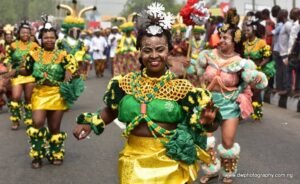

The Efik people are an ethnic group found in Cross River and Akwa Ibom States of Nigeria. It’s Creek Town and environs are commonly referred to as Calabar and its people as Calabar people. The name ‘Calabar’ was given by Europeans who came to the land many years ago. Apart from the Southsouth geo-political zone of Nigeria where they are located, they also occupy Southwestern Cameroon including Bakassi. The people of Uruan were said to have given the name ‘’Efik’’ deriving from a verb meaning to press or oppress since they were alleged to be aggressive.
The Efik people are related to the Annang, Ibibio, Oron, Biase, Akamkpa, Uruan and Eket people. They are said to have migrated from Igbo and Ibibio before settling at their present location. The bulk of them left Uruan in present day Akwa Ibom State, some to Eniong and surrounding areas. They stayed in Uruan for about 100 years and then moved to Ikpa Ene and Ndodihi briefly before crossing to their final destinations in Creek Town.
The people were originally based on fishing, the area later developed into a major trading center in the early 1900s. Incoming European goods were traded for slaves, palm oil and other palm products. The Efik were middlemen between the white traders on the coast and the Inland tribes of the Cross River and Calabar district.
The people were the first to embrace western education in present day Nigeria. This is as a result of the presence of Christian missionaries in the middle of the 19th century. Notable among the missionaries is Mary Slessor, a Scottish missionary who eliminated the tribal superstitious practice of killing twin babies. The Efik king, also known as the Obong of Calabar is the leader of the Efik people.
The people speak the Efik language, which is a Benue-Congo language of the Cross River family.
The traditional attire for the people consists of a few pieces, which are the traditional wrapper and chieftaincy shirt for men. The women are dressed in wrapper and short sleeveless blouse. The wrappers worn by both the men and women are an ankle leg piece of cloth, wrapped to look like a shirt, usually with traditional ornament on it.
The people in time past confine a prospective bride to a secluded room known as the ‘Fattening Room’. She is given an all around training and beauty therapy within a particular time frame in order to get her prepared for womanhood and marriage.
The popular dance among the people is the Ekombi dance. It is a colorful dance that is precise and said to be derived from the rhythmic movements of sea waves.
The Nigerian favorites soup recipe of Edikang Ikong and Afang soups are native to the Efik. These delicacies have nutritional values which make the people to be very healthy.